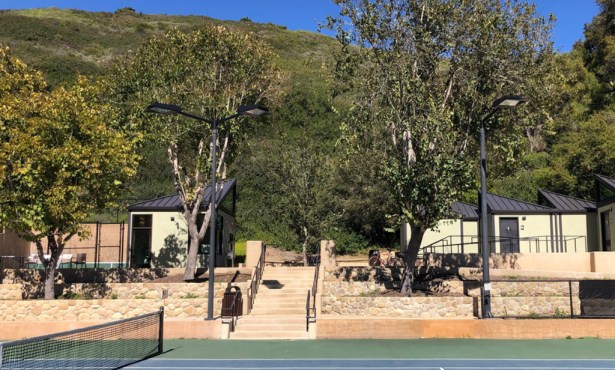Inside the United Gates of America
Charlie LeDuff Comes to Town to Talk About his Hilarious,
Thought-Provoking Doc
I thought the fest guide said 7:15 p.m. on Monday night, so I
nearly had to run over to Center Stage Theater to catch the 7 p.m.
final showing of
United Gates of America, New York Times
journalist Charlie LeDuff‘s
documentary about life behind the suburban gates in Canyon Lake, California.
 As I approached the door, the film
As I approached the door, the film
fest’s Mike “Tak” Takeuchi greeted me, and introduced me to LeDuff
(pictured on the right), who was standing near the entrance as a
nearly sold-out crowd waited inside.
As I shook his hand, I was caught entirely off-guard. I’d read
much about LeDuff’s work in the past years, and his involvement —
a print journalist going documentary-style —
naturally intrigued me. But to run into the Pulitzer Prize-winning
journalist outside his screening was unexpected, even
intimidating.
“Have a cigarette with me,” LeDuff ordered, pulling out a
Winston Light.
“Okay, I will,” I answered, realizing this could be a good
networking opportunity, or at least a good story somewhere down the
line.
“Why don’t they let us say what we all know is true? Why don’t
they let us write what everyone else is talking about?” LeDuff
asked me. “You know what I’m saying?”
“Uh, yea, for the most part, I think so,” I replied,
understanding that there are some boundaries with which we as
journalists are obliged to, such as not reporting on
unsubstantiated rumor and not divulging off-the-record comments
(which are usually the most insightful).
I wasn’t, however, entriely sure what he was talking about. He
seemed paranoid, agitated, and excited all at the
same time. He talked about his two-year-old daughter, he talked
about being tired of the Times, he talked about
church-building in Michigan, and Jews feelings about Zionism — all
over the course of a smoke. I began to wonder how this apparently
crazy dude (whose wild hair and goatee, I must admit, began to
remind me of myself) was such a prestigious journalist.
Then I noticed a very familiar smell coming off his lips. Is
that whiskey?, I thought. Bourbon? Jack and coke? Whatever it was
— and I’m pretty sure it was a brown liquor — Charlie
LeDuff was drunk. And what better time to celebrate, I
figured, than when you’re showing off your movie?
“You wanna come for drinks with us after?” he asked me.
“Sure,” I replied cautiously, weighing the possible connective
benefits against the likelihood of grogginess and general dismay
the following morning. I’m usually one to jump at all chances of
interesting conversation and unbridled revelry, but as I get older
and assume more responsibilities, I’m starting to worry about
consequences. I guess I might be losing my edge.
With that, I went inside, grabbed one of the last seats in the
upper leftside of Center Stage, and awaited the film. LeDuff and
his producer Todd
Schindler soon came out to introduce the film, propping up a
chalice-type object and proceeding to each balance on it for a few
seconds. LeDuff delivered a tangential, somewhat rambling
introduction, causing many in the crowd to wonder about his
sobriety level. “Is he drunk?” asked the oblivious woman behind me,
oddly aghast that a journalist might take a swig now and then. Most
of the crowd just chuckled along.
Then the lights dimmed and the screen lit up with the SBIFF
trailer. “That’s not my movie!” shouted LeDuff, which got some
laughs. And then came The United Gates of America.
The hour-long documentary, originally made for BBC (which
explained LeDuff’s earlier comment to me that he “had to go to
England to get this made”), was hilarious, probing, and meaningful.
We watch as LeDuff enters Canyon Lake, California’s largest gated
community, and begins to get the lay of the land. We meet a
realtor, a stoner kid, a suburban slut, skinheads, rejected
Mexican-Americans, political wannabes, and quite a few seemingly
normal people.
LeDuff, mostly sober on film save for the house parties where
everyone is drunk, examines whether living behind gates is really
safe. Rapes doubled over the last year, he found out to the
residents’ displeasure, and someone burned a house down after
managing to somehow get through the gates. The stoner kid provides
the most poignant commentary, as it’s his generation who have
nothing to do within the walls other than get drunk (which seems to
be okay based on teens drinking openly on the beach), get high, or
think about escaping to the military (which the boy is too stupid
for).
This is eye-opening stuff, and LeDuff, a Detroit-raised man
clearly suspicious of the whole set-up, reponsibly does not draw
any solid conclusions for the viewer. We are left wondering whether
these Canyon Lake residents are paranoid or correct, whether life
behind the walls is actually safer or more comfortable.
Following the screening, LeDuff and Schindler stood up to answer
some questions. LeDuff, markedly more sober than before, still
proved evasive, but generally was in tune with the whole notion of
letting the viewer decide the reality. One astute watcher opined
that it seemed the people of Canyon Lake were trying to recreate
something — community and neighborhoods — that we’ve already
lost. LeDuff agreed.
After the Q&A, I wondered if LeDuff would catch me to snag
drinks. I still wasn’t sure if I’d go, because I figured it might
be a fun time but probably not one that he’s really remember. But
he was bombarded with people wanting to chat with him in person, so
I was able to exit down the stairs and into the rainy night. Until
we meet again, I guess, and let’s try to make sure it’s a Friday or
Saturday, when the following morning’s woes don’t interfere with
work.



